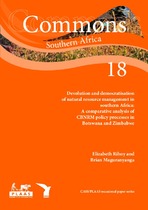Devolution and democratisation of natural resource management in southern Africa: A comparative analysis of CBNRM policy processes in Botswana and Zimbabwe
Abstract
This paper examines the policy processes of devolution and democratisation of natural resource management as they relate to community-based natural resource management (CBNRM) outcomes in Botswana and Zimbabwe. Devolution and democratisation of natural resource management are socially and politically contested issues that reveal interesting insights about the nature of local governance and democratic practices in these two countries. Through an analysis of factors affecting the CBNRM policy process – including the role of key actors, sets of policy ideas and narratives, and political influences – the authors identified evidence of shrinking political and policy spaces for local communities and civil society to effectively influence policy. This shrinking of political and policy spaces reflects a limitation of democratic practice and space in Botswana and Zimbabwe due to authoritarian political practices and socio-political and economic challenges. These factors have stifled opportunities for devolution of natural resource management and positive CBNRM outcomes. Based on primary and secondary data, this study argues that if this impasse is to be overcome, policymaking and implementation of CBNRM should take cognisance of socio-economic and political forces at local and national levels and recognise the intimate links between these levels. Evidence from the two countries indicates that strong and influential actor-networks – which are necessarily locally driven – are vital in mobilising strong political support which in turn is central in the development of an appropriate policy environment. The evidence further suggests that local government can play a crucial role in sustaining CBNRM in the face of threats of recentralisation from political and economic elites in whose interest recentralisation lies. At the national level, local government can play a critical role in maintaining political support and legitimacy for CBNRM. At the local level, it provides essential checks and balances that can prevent elite capture of benefits and provide neutral arbitration services when community polarisation stalls momentum. Ultimately, the paper argues that local government can be a vital element in ensuring democratic outcomes, serving as an effective link between local and national scales. CBNRM implementers and advocates need to ensure that institutional and legal arrangements strike a delicate balance in serving the interests of marginalised communities through devolution and allowing decentralisation to empower local communities to direct their destiny through the creation of democratic policy spaces. This requires paying attention to the political landscape of CBNRM and engaging in innovative and strategic political manoeuvring and dialogue with government bureaucrats, politicians and other relevant stakeholders.

